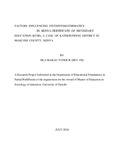| dc.description.abstract | The purpose of this study was to investigate the factors influencing students’ performance in
mathematics in the (KCSE); A Case of Kathonzweni district. The study focused on form two,
form three and form four students, their mathematics teachers and principals who were randomly
selected from the five secondary schools under study. Two hundred students’ and ten
mathematics teachers were randomly selected in order to participate in the study whereby the
researcher was using 40 students from each school.
On professional qualification none of the mathematics teachers had doctorate in philosophy
(Ph.D). One mathematics teacher was a holder of master of education (M.Ed) degree. This was
10% of the ten mathematics teachers. Four mathematics teachers were holders of bachelor of
education (B.Ed) degree which is 40% percent of the total number of teachers under study. Two
teachers were holders of post graduate diploma in education (P.G.D.E) and this was 20%. Two
teachers were holders of Diploma in (Dip.) Education which was 20% of the teachers
interviewed. Lastly there was one teacher who was a holder of S1 certificate which was 10% of
the ten teachers’ respondents.
About 50% percentage of mathematics teachers indicated that they had teaching experience
ranging from two to six years in teaching profession. Rarely 80% percent of the respondents
indicated that they had worked for over six years in the teaching area.
v
On the gender of mathematics teachers the ratio of female to male mathematics teachers, was
revealed that only one female teacher to six male teachers (1: 6) were in the field of study.
Out of hundred and sixty one students who responded to the questionnaire, hundred were male
and sixty one were female. On age in years 30% of respondents were of age between sixteen to
eighteen years while one hundred and twenty two respondents which was 70% were of the age
between nineteen and forty five years.
On the major problem that the students encountered on learning mathematics, it was revealed
that some of the objectives in mathematics were unrealistic and not easily achievable within the
given time and resources. It was also shown that there were many (seven subjects) taught and as
a result the students did not master the expected basic views.
Further on the major problem encountered by the students, it was shown that the students found
it difficult to relate different concepts in the topic of mathematics. The respondents noted areas
such as trigonometry, vectors, commercial arithmetic etc of which they found them difficult to
work on. They find it hard to use logarithm tables and calculators in solving problems related to
the topic such a cosines, sines and tangent. It was desired that where there were overloads,
overlaps or complicated topics, it was necessary to address and remove some contents.
It was concluded that the schools under study performed poorly in mathematics in the Kenya
Certificate of Secondary Education (KCSE) due to students’ attitude towards mathematics as
students believe that mathematics is the hardest subject. It was also concluded that there were
inadequate number of teachers particularly in mathematics, resulting into a situation where
vi
students are not adequately prepared for national examinations. It was also concluded that the
male teachers dominate i.e. they were the majority hence leading female students to perform
poorly as female teachers were less than male teachers.
It was recommended that there has to be a balance of male and female mathematics teachers.
This would enable consistency of performance of female students as they would be motivated by
their female teachers. It was recommended that some difficult topics in mathematics be
restructured into simple and manageable topics especially in vectors, commercial arithmetic and
trigonometry, algebra etc. It was therefore recommended that those topics which are difficult
should be repeated in other levels in a simpler way. It was also recommended that teacher
should be innovative and creative in teaching mathematics.
It was suggested that this study should be carried out in a wider coverage to include other
schools outside Kathonzweni district. Further research was suggested on the topics which were
overlapping or overloaded and are difficult to manage by students. Further research should be
carried on the effectiveness of the provision of remedial classes. It was suggested that a study be
carried out on the effect of emerging issues such as industrial transformations, health education
issues like drug abuse and HIV/AIDS perdemics, children rights, moral values and social
responsibility in relation to academic performance. | en_US |

